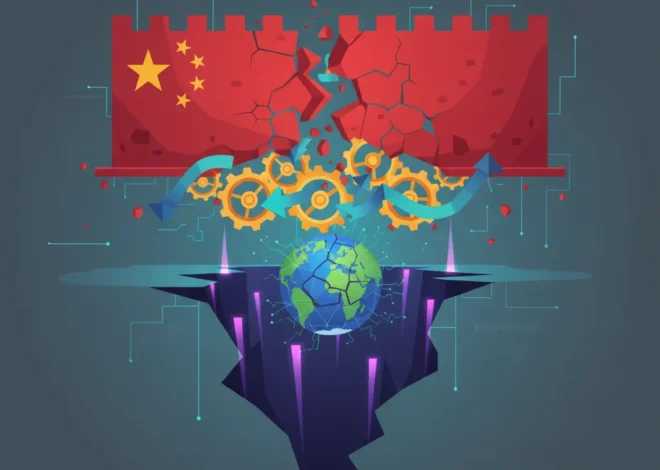
The Great Wall of Westminster: How UK Politics is Redrawing the Map for Finance and Investment with China
In the world of global finance, political whispers can be as impactful as trading algorithms. A quiet shift in tone, a new piece of legislation, or a sudden diplomatic fallout can send shockwaves through the stock market, redraw investment strategies, and redefine economic partnerships. Right now, one of the most significant of these shifts is occurring in the halls of Westminster, and its epicentre is the United Kingdom’s increasingly complex relationship with China.
A recent spying scandal, which saw a parliamentary researcher arrested under the Official Secrets Act for allegedly spying for Beijing, has ignited a political firestorm. This single event has dramatically complicated what was already a delicate balancing act for the UK’s political establishment. For Keir Starmer’s Labour party, widely expected to form the next government, an ambition to rebuild a pragmatic and stable relationship with the world’s second-largest economy is now running headfirst into a wall of cross-party “Sinoscepticism.”
This isn’t just a matter of foreign policy; it’s a critical issue for anyone involved in finance, investing, and the broader UK economy. The political climate in London is setting the stage for a new era of UK-China relations, one that will be defined more by risk management than by open collaboration. For business leaders and investors, understanding this new reality is paramount.
From Golden Era to Glacial Stare: A Decade of Change
It wasn’t long ago that the UK-China relationship was in a completely different place. During the “golden era” of the 2010s under Prime Minister David Cameron, the UK actively courted Chinese investment. The rhetoric was one of partnership, opportunity, and mutual economic benefit. Chinese capital flowed into UK infrastructure, real estate, and technology, while the City of London sought to become the primary offshore hub for the renminbi.
However, the geopolitical landscape has shifted dramatically. A series of events, including Beijing’s crackdown on pro-democracy protests in Hong Kong, concerns over human rights in Xinjiang, and growing national security alarms over Chinese technology companies like Huawei, have systematically eroded that goodwill. The political consensus in Westminster has hardened, with influential figures from all major parties now viewing China not just as an economic competitor, but as a systemic and strategic threat. The recent spying allegations, which China has called “malicious slander,” have only served to concrete this perception (source).
Labour’s Tightrope: The “Compete, Challenge, Co-operate” Conundrum
This is the treacherous environment the Labour party hopes to navigate. Shadow foreign secretary David Lammy has articulated a nuanced “three Cs” strategy: compete with China where necessary, challenge its actions on issues like human rights, but also co-operate on global challenges like climate change. In theory, this sounds like a pragmatic approach. In practice, it’s an incredibly difficult line to walk.
The recent events have empowered the more hawkish wings of both the Conservative and Labour parties. Any move by a future Starmer government that appears to be “softening” its stance on Beijing will be met with fierce political opposition. As one senior Labour figure noted, the spying case “makes it much harder” to pursue a more engaged dialogue with China according to the Financial Times. This political pressure will inevitably influence decisions that have direct consequences for the UK economy, from trade policy and investment screening to collaboration on financial technology.
The economic stakes are undeniably high. Despite the political cooling, the financial ties between the two nations remain substantial. A look at the trade data reveals a deep, if complicated, interdependence.
| Trade Metric | Value | Key Sectors / Notes |
|---|---|---|
| Total UK Exports to China | £37.5 Billion | Includes cars, medicinal products, and professional services. |
| Total UK Imports from China | £66.7 Billion | Dominated by telecoms equipment, electronics, and consumer goods. |
| Total Trade Volume | £104.2 Billion | Represents a significant portion of the UK’s non-EU trade. |
| UK Trade Deficit with China | -£29.2 Billion | A persistent feature of the economic relationship. |
Data synthesized from various public government sources for illustrative purposes.
This data highlights the core dilemma. A significant portion of the UK economy relies on this trade relationship, yet the political will to maintain, let alone grow, these ties is rapidly diminishing. This creates a volatile environment for businesses and investors who have built their models on the foundations of stable global trade.
The Ripple Effect: What This Means for Finance and Investing
The political chill in Westminster is not an abstract debate. It has tangible consequences for multiple facets of the UK’s financial ecosystem.
1. Geopolitical Risk in Investment Portfolios
For investors, this new era demands that geopolitical risk be moved from a footnote to a central thesis in their analysis of UK-listed companies. Sectors with high revenue exposure to China—such as luxury goods, higher education, automotive manufacturers, and mining giants—face significant headwinds. A sudden trade dispute or targeted sanctions could severely impact their bottom line. Valuations on the stock market may start to reflect a “Sino-scepticism discount” for firms heavily reliant on the Chinese market.
2. The Future of Banking and Financial Services
The City of London’s global standing is built on its openness and connectivity. A more adversarial relationship with China could threaten this. UK-based banks with significant operations in Hong Kong and mainland China, such as HSBC and Standard Chartered, have already found themselves in precarious positions, navigating between Western political pressure and Beijing’s legal requirements. Increased scrutiny of Chinese investment into the UK could also slow down M&A activity and capital flows that have historically boosted the banking sector.
3. A New Trajectory for Financial Technology (Fintech)
The tech cold war between the West and China could have surprising consequences for the UK’s thriving fintech scene. On one hand, it could stifle collaboration and access to the vast Chinese market. On the other, it could spur innovation. Concerns over data security and the weaponization of financial networks may accelerate the development of domestic or “friendly-bloc” financial technology solutions. This could create opportunities in areas like secure cross-border payments, cybersecurity for financial institutions, and even the use of blockchain for creating transparent and resilient supply chain financing systems that are less vulnerable to geopolitical shocks.
Navigating the New Normal: A Strategic Outlook
For business leaders and finance professionals, the path forward requires a strategic recalibration. The “set it and forget it” approach to China is no longer viable. The key is to build resilience and agility.
- Supply Chain Diversification: The most immediate action is to reduce over-reliance on a single market. Businesses are increasingly exploring “China plus one” strategies, seeking alternative manufacturing and sourcing hubs in Southeast Asia, India, or Eastern Europe.
- Enhanced Due Diligence: Investing in China or partnering with Chinese firms now requires a much deeper level of due diligence, one that includes political risk analysis, an understanding of local regulations, and potential exposure to international sanctions.
- Scenario Planning: Companies must actively model various scenarios, from a further deterioration in relations to a partial stabilization. How would your business, trading strategy, or investment portfolio perform under different political outcomes?
The UK’s relationship with China is at a crossroads. The political rhetoric in Westminster, amplified by the latest spying scandal, is pushing the country down a path of caution and confrontation. While a complete economic decoupling is unlikely and undesirable for the UK economy, the era of unbridled engagement is definitively over. As one diplomat aptly put it, the challenge is to define a relationship that is “clear-eyed and robust” (source).
For the financial world, this means adapting to a new paradigm where political risk is as important as market risk. The decisions made in Westminster in the coming months will shape the landscape of international trade, banking, and investing for years to come. The dragon’s shadow over the UK economy is long, and navigating it successfully will require not just economic acumen, but keen political insight.


